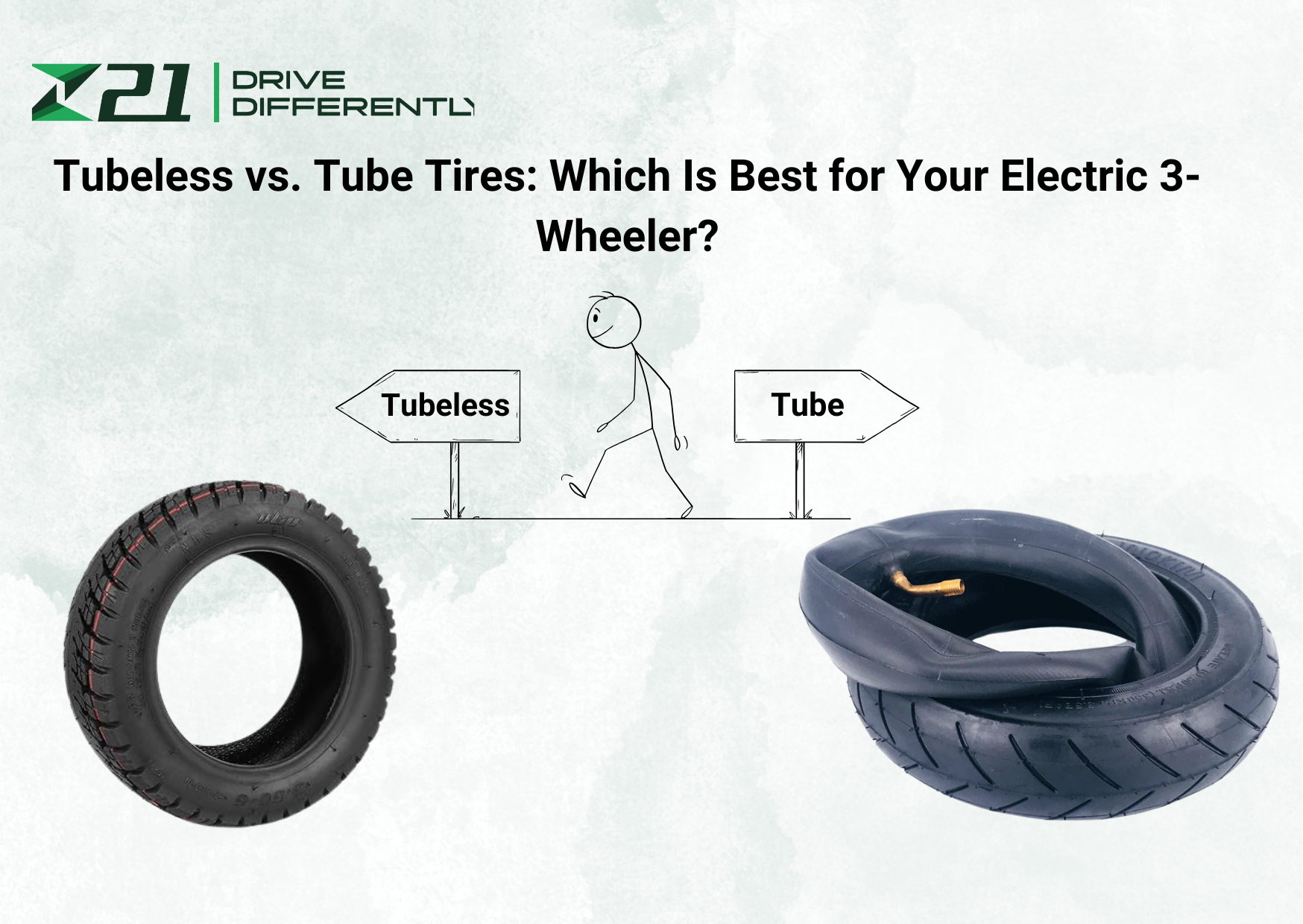When it comes to choosing the right tires for your electric 3-wheeler, one of the key decisions is whether to opt for tubeless vs tube tires for electric 3-wheelers. Both types have their pros and cons, and understanding these differences is essential to ensure the best performance, safety, and efficiency for your electric vehicle. In this blog, we will dive into the details of tubeless vs tube tires for electric 3-wheelers, helping you make an informed choice that aligns with your vehicle’s needs.
What Are Tube Tires and Tubeless Tires?
Before we compare tubeless vs tube tires for electric 3-wheelers, it’s important to understand what sets them apart.
Tube Tires: Traditional tube tires consist of an inner tube that holds air. This tube is placed inside the tire, which helps maintain tire pressure and cushion the vehicle.
Tubeless Tires: Tubeless tires are designed to hold air directly within the tire itself. These tires have a sealed bead that creates an airtight fit, eliminating the need for an inner tube.
Pros of Tube Tires for Electric 3-Wheelers
- Ease of Repair: Tube tires are relatively easy to repair in case of a puncture. If you encounter a puncture, the inner tube can be patched or replaced without removing the entire tire.
- Cost-Effective: Tube tires are generally more affordable than tubeless tires for electric 3-wheelers. For fleet owners looking to keep initial costs down, tube tires can be an economical option for electric 3-wheelers.
- Wider Availability: Tube tires are widely available and can be found in various sizes. This makes them easier to source when replacement tires are needed.
Cons of Tube Tires for Electric 3-Wheelers
- Higher Risk of Punctures: Tube tires are more prone to punctures and leaks, as the inner tube can be damaged by sharp objects on the road. This can lead to more frequent repairs, which might be inconvenient for daily operations.
- Higher Maintenance: The need for regular monitoring of the tube’s pressure and frequent tire maintenance may add up over time, increasing the operational cost for fleet owners.
Pros of Tubeless Tires for Electric 3-Wheelers
- Lower Risk of Punctures: Tubeless tires for electric 3-wheelers are less likely to suffer from punctures because the air is contained within the tire itself. When a tubeless tire is punctured, the air often escapes more slowly, giving the driver more time to react and find a safe spot to stop.
- Better Performance: Tubeless tires for electric 3-wheelers are generally more efficient than tube tires. They reduce the risk of friction between the tube and tire, which can contribute to better fuel efficiency and smoother rides. For electric 3-wheelers, this translates to better range and performance.
- Improved Safety: In the event of a puncture, tubeless tires deflate more gradually, reducing the chance of sudden tire blowouts that could be dangerous. This feature is especially useful for electric 3-wheelers used in busy urban environments.
- Lower Maintenance: Tubeless tires require less maintenance compared to tube tires. With fewer components to manage (no inner tube), the chances of maintenance issues are reduced, leading to lower operational costs over time.
Cons of Tubeless Tires for Electric 3-Wheelers
- Higher Initial Cost: Tubeless tires for electric 3-wheelers generally have a higher upfront cost than tube tires. Although they can save money in the long run through reduced maintenance and fewer repairs, fleet owners need to consider the initial investment.
- Difficult to Repair: Repairing a tubeless tire can be more complicated than fixing a tube tire. In case of a puncture, the tire needs to be removed and patched from the inside, which can be time-consuming and requires specialized tools.
Choosing the Best Tire Type for Your Electric 3-Wheeler
When deciding between tubeless vs tube tires for electric 3-wheelers, it’s important to consider several factors, including the vehicle’s purpose, operating environment, and budget.
- Budget and Cost Considerations
If you’re on a tight budget and need a more affordable option for tire replacement, tube tires may be a better choice. However, if you’re looking for long-term savings, tubeless tires could be a better investment due to their durability and reduced maintenance requirements. - Vehicle Usage
For electric 3-wheelers used in heavy-duty or commercial operations, tubeless tires for electric 3-wheelers may offer better durability and safety. Fleet owners who need to ensure that their vehicles are always operational will benefit from the reliability of tubeless tires, which can handle more wear and tear. - Safety and Performance
If your electric 3-wheeler will be used in areas with unpredictable road conditions or frequent stops, tubeless tires for electric 3-wheelers may provide better safety and performance. They are more resistant to punctures and offer smoother handling, reducing the risk of tire blowouts or sudden pressure loss. - Maintenance and Repair
If minimizing downtime and maintenance costs is a priority, tubeless tires for electric 3-wheelers may be the better option. Their lower maintenance needs and improved performance make them ideal for electric 3-wheelers used in urban environments where constant operation is necessary.
Both tubeless and tube tires have their unique benefits and challenges. Tubeless tires for electric 3-wheelers offer superior safety, efficiency, and performance, making them the ideal choice for electric 3-wheelers used in demanding environments. On the other hand, tube tires are more affordable and easier to repair, making them suitable for those on a budget or with less frequent operational needs.
Ultimately, the right tire for your electric 3-wheeler depends on your specific requirements. Whether you’re focused on long-term savings, safety, or ease of repair, carefully consider these factors before making your choice.


